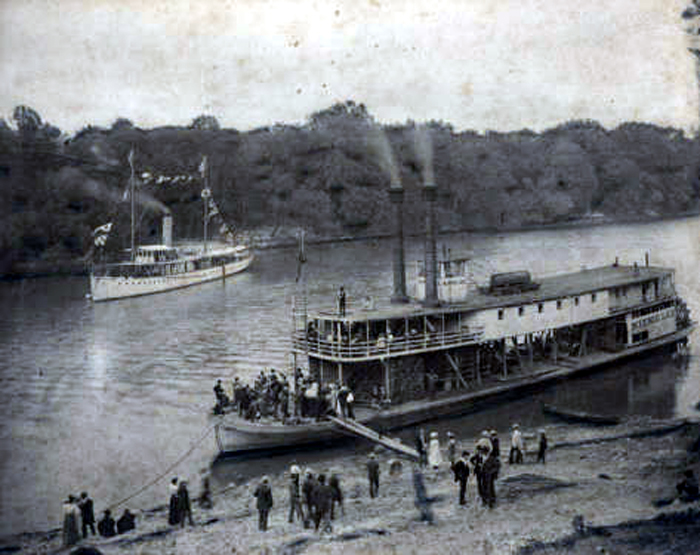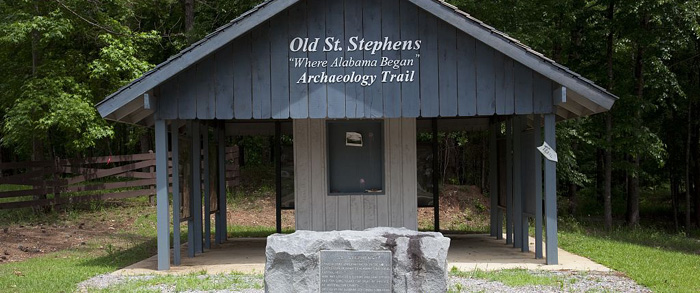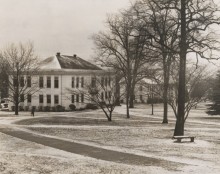Reminiscences of Old St. Stephens PART V – Lover’s leap
PART V
(Read at the Centennial Celebration, May 6, 1899. It was published in four installments in the Washington County News, St. Stephens, May 25, and June 1, 8, and 15, 1899.)
By Miss Mary Welsh,2 of Shuqualak, Missi

TAILORS
As may be supposed, in a town of so much wealth, trade and industry, when ready-made clothing was not in the market, there was a good opening for tailors. I know there were some who drove a brisk trade there in its early settlement though I cannot call their names. Later, Mr. Benj McAuglin plied successfully the same trade; but when or whither he went, I do not know. Later still was a MR. Thomas P. Belancey—I spell the name as pronounced. He moved to Gainesville, Ala., in 1833, afterwards to Kemper County, Miss., where he married Jane Breedlove and died. His children are still living there.
SILVERSMITH
During the “flush times” a silversmith pitched his tent and plied his trade for several years. Of the character of his work, I have as proof a set of teaspoons made to order for my father and mother when they went to housekeeping in 1820. That they are genuine solid silver is shown by the fact that they have stood the wear of nearly eighty years’ service without damage or dimness. Honest work! All credit to the honesty of St. Stephens’ only silversmith—John F. Sossamon.ii
OFFICIALS
There were many others whom I remember, and others whose names I find in an account book, but I thought it would serve the purpose better to confine myself to those who were connected with some profession or industry within the limits of the town. I should like to speak of my schoolmates all of whom I remember kindly, but it would take too much space. Perhaps I should add, that my father, George Welsh, was for many years deputy sheriff, and I think Judge George Lister was the sheriff. During some of these years, if not all, Judge Lipscomb presided over the court.
COURT-HOUSE
I do not know where the court-house was located in the earliest history of the town, but I know as far back as my recollection or information extends it was ten or more miles above among the hills. Not till after Mr. Hazard’s death was it moved to its present site. Afterwards, the few remaining inhabitants of old St. Stephens arose in a body and moved out to the same place. I presume the county records will show the date.
Have you ever had ‘blueberry pickles’, ‘batallia pie’ or ‘snow birds’? You will learn all this and more in “VINEGAR OF THE FOUR THIEVES: Recipes & curious tips from the past
LOVERS LEAP
Of the tradition connected with the famed Lover’s Leap, I have heard two versions. It is just possible that the romantic scenery, coupled with early associations gave rise to the legend. The bluff is very high, covered with and surrounded by rugged beauty; an enchanting spot to those who are fond of wild scenery, of whom I confess myself to be one. A cave near by, rather difficult of access, white as marble throughout, is the traditional arsenal of the old Spanish fort. Farther up the channel of the river are the once formidable McGrew Shoals, which so long obstructed navigation. The family from which they took their name are all gone; but the shoals will keep the name while boats run the river.
HAGAR, A FREE NEGRO WOMAN
Well, I would not be true to myself and perhaps not to the subject in hand were I to omit the mention of one individual, whose condition was unique for those days—a free negro—Aunt Hagar. She lived on a high hill back of the business streets. She was a law abiding citizen; cultivated her own little garden and patches; had her cow and chickens, and enjoyed the full confidence of the whites. How we, the little ones, did love to visit her, with or without permission, as the case might be! She always gave us a kind reception, and oftimes a treat. Looking back through all the intervening years, I can truthfully say that a slice of her corn hoe-cake split open and spread with butter of her own make tasted sweeter to me then, than the nicest cake does now. How much of the happiness of our lives depends upon association. She passed away before or during the Civil War. Peace to the memory of old St. Stephens’ humblest citizen.
L’ ENVOI
Now, good-bye, dear old town. My heart beats with warmest love for you and breathes a sigh for your early desolation. Yet it is comfort to know that the same moon and stars that nightly watch over your desolation, the same sun that floods your hills and glades with the glorious beams of day, also watch over and light me in my far Mississippi home. Possibly some may think there is too much sentiment in this sketch; perhaps so for historical purposes; but not for my one dear old St. Stephens schoolmate, and my loved new St. Stephens relatives, at whose request, and for whose pleasure I have written. Anyway, I could not help it. I have revised it on purpose to eliminate some personal experiences. It has been a constant struggle to keep my feelings in abeyance. All the while I was writing, my heart kept crooning snatches of the old hymn:
“Yes, my native land, I love thee,
All thy scenes I love them well, I love thee, oh, I love thee
More than human tongue can tell.”
APPENDIX
R. H. GILMER’S ASSAULT ON WM. CRAWFORD, AND HIS SUBSEQUENT SUICIDE. Sometime prior to 1805, R. H. Gilmer, said to have come from North Carolina, located in Washington County, Mississippi Territory (now Alabama). He was a lawyer, and at the town of Wakefield, Sept., 1805, the Hon. Harry Toulmin presiding, it being his first term as judge in what is now Alabama, the following order was made: “RhodoMinique H. Gilmer was admitted to the practice of an attorney of this court, he having first produced a License and taken the oath prescribed by Law.” He resided in or near St. Stephens, followed his profession, and appears to have been a good lawyer. His career was checkered, and his end a tragic one. After the annotation of the foregoing paper, the following letter was found by the editor in his McKee Miss., and as it so vividly pictures the details of this untimely occurrence, and at the same time confirms the statements of Miss Welsh, it is given in full. The cause for the assault is not known.—See Note 8, supra. Dinsmore To McKee. St Stephens 13th March 1821 Dear Sir, I wrote you some [time] ago & prescribed to save your life or your neck, that is in the last resort to come to St Stephens! little doubting at that time that our atmosphere was a panacea. Terrible times at our house massa Johny (sic), de crow he been dead! You know the rest! Last Saturday at high Meridian Rhodominie Howe Gilmer sculked (sic) behind Vinus’ house & discharged a large fowling piece loaded with shot & Ball of different sizes at William Crawford who was walking alone in the street some twenty of which entered his body. Gilmor supposing he had finished his work, mounted Col Hanes horse & fled. He was soon pursued in different routs & in about three hours was discovered & surrounded by George S Gaines & others to whom he said he surrendered but as they approached, he rolled up his sleeve & cut the veins & arterk’s of his left arm so that he bled to death in their presence. Some one seeing his fate inevitable said “Pity”. Gilmer replied no pity. Mr Gaines asked if he had any communication for his family he answered, “No I have killed a villain & am satisfied.” He is cheated for Crawford is pronounced out of danger and all decent folks glad on’t. I give you this hasty ace to correct the errors of travelling passers. Notwithstanding we want to see you. if rogues do put themselves to death it is no reason honest men should. N. B. Col Freeman has commenced the Choctaw (sic) Boundary. Thos H says the 17 Feby the Spanish treaty has arrived ratified & but for the death of Mr Burwell of Va would have been decided on that day in the Senate Silas Dinsmore Col John McKee Address: “Col John McKee | Erie | Alabama”
“VINEGAR OF THE FOUR THIEVES: Recipes & curious tips from the past
SEE ALL BOOKS BY DONNA R. CAUSEY





